AE graduates tell us about their next adventure.
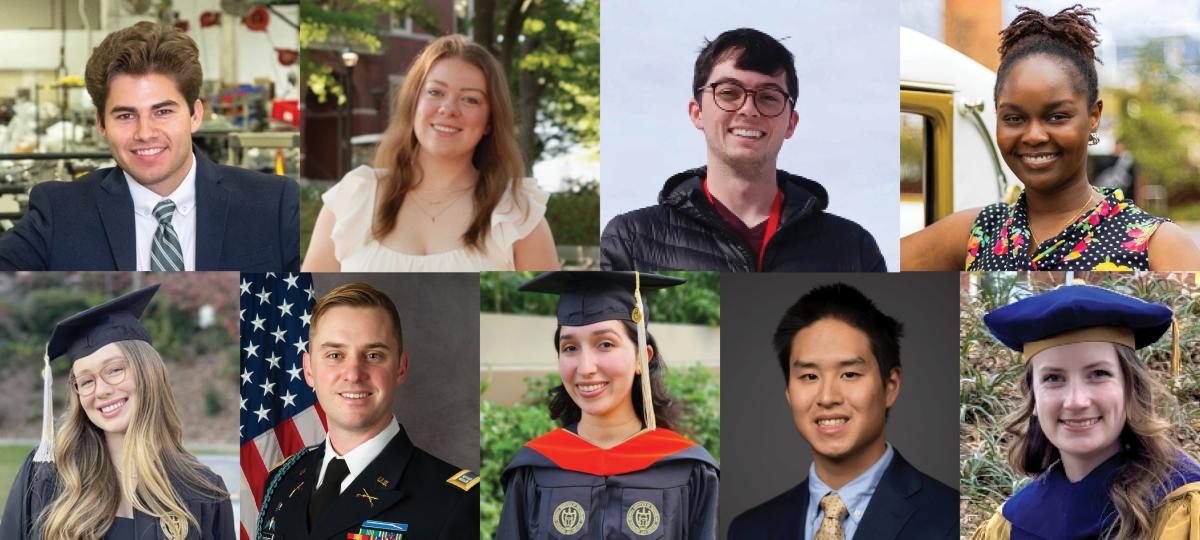
Anthony L Bertoni
BSAE 2024
What is your next adventure?
Following in the footsteps of my mom and a number of extended family members, my long-term goal is to become an entrepreneur/business owner, likely in the field of engineering. In pursuit of this goal, my next step is to further develop my communication and writing skills as a paralegal at a small family law firm just 30 minutes north of Atlanta.
What about your next adventure are you most looking forward to?
I'm most excited to be working with my brother, who also works at the firm. On a personal level, I thought it would be good to take a deep breath, appreciate what I've achieved, and spend more time with my family until I’m ready to chase my next dream.
Did you have any previous co-op, internship, or research experience in this area?
While becoming a paralegal seems like it would be quite different from engineering without descriptive language, my job description during my first internship with GE Aerospace on the GE9X Hot Section design team could be mistaken for it. To make my point, as a design engineer, my main task was to substantiate design or test plan changes and present it at tech review.
Last summer, I interned with the Aerodynamics team on my second rotation at GE Aerospace, where I developed CFD models for centrifugal compressors. At one point, this was literally my dream job. I excelled in the role; however, it was very, very technical. Even though they offered me an opportunity to return, I realized I wanted to grow in ways that these roles would not provide.
During my time at Tech, I had the opportunity to work in a couple of research labs. Currently, I’m in the High-Powered Electric Propulsion Lab with Professor Mitchell Walker aiding in the diagnostic development of Hall-effect thrusters. Before I got in the door at GE, I worked in the Computational Combustion Lab with Professor Suresh Menon, using CFD to simulate the combustion performance of a Rotational Detonation Engine (RDE).
By far, my favorite extracurricular activity was a project called the Aerospace Propulsion Outreach Program (APOP) funded by the Air Force research Lab. A group of six undergrads and I spent a year improving the thrust-to-weight ratio of a micro gas turbine engine by 30.3%.
How did your educational experience at Georgia Tech help you to achieve your goals?
My goal has been and always will be to sharpen my mind. While I was in school, I was thankful for the educational and research opportunities in designing and testing propulsion systems, but more important than the specific ideas I was privy to, I learned a framework for thinking critically. Put simply, I learned the importance of asking the right questions and how to fill in the gaps to get to the answer.
What advice would you give to an underclassman who would like to follow the same path?
Before anything, make sure you are meeting your basic needs, taking special care to learn how to deal with stress. Equally important is to stay anchored to your family and friends. Finally, both in the context of your career and life, face your fears head-on and go where you can grow.
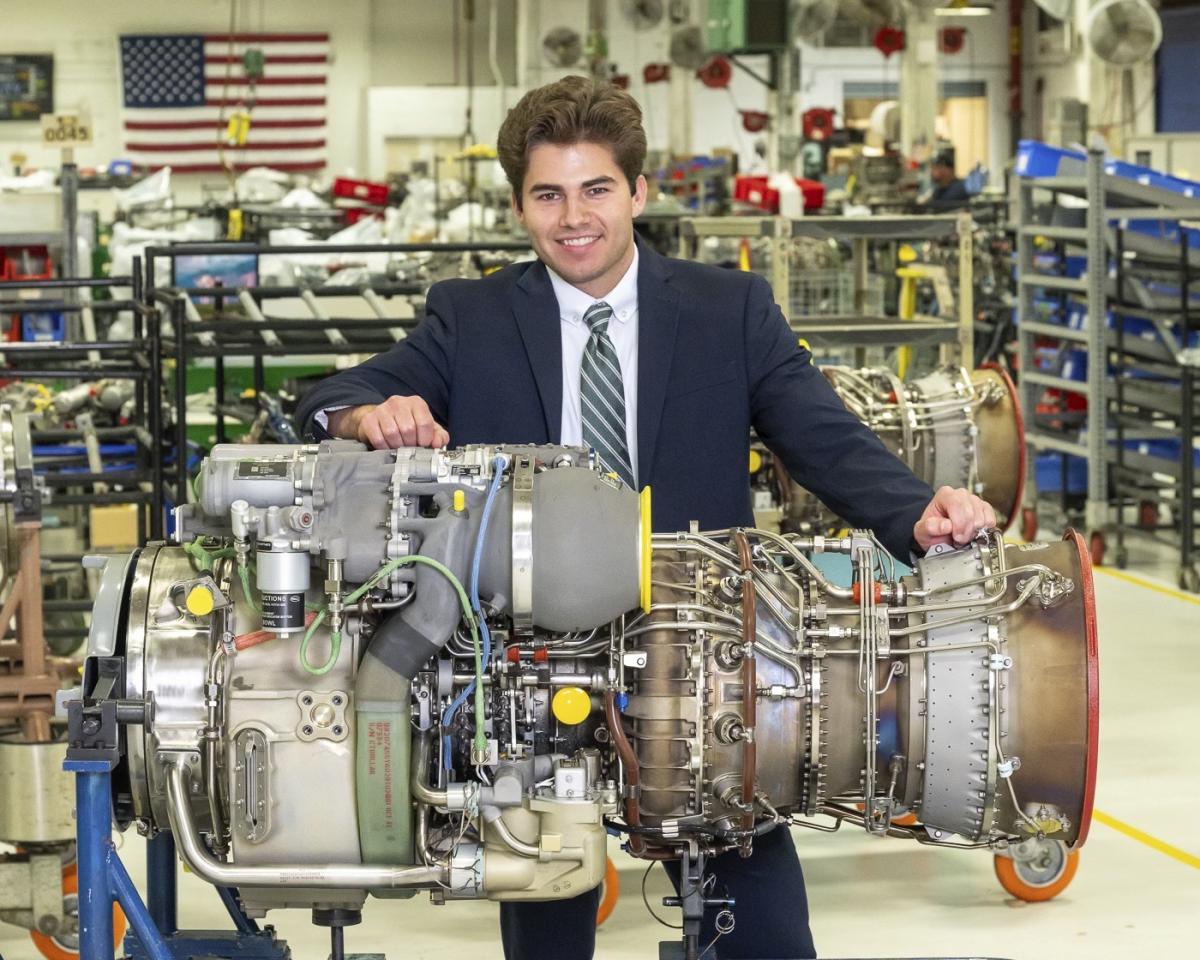
Anthony L. Bertoni
Ivanska V. Báez Cartagena
MSAE 2024
What is your next adventure?
Right now, I’m actively interviewing for multiple positions, specifically as an electric propulsion engineer. So, it could be the East Coast, West Coast, or even London.
What about your next adventure are you most looking forward to?
I’m looking forward to being home and spending time with my family in Puerto Rico. I think this will be one of the last times, in the near future, that I will get to spend some indefinite time with them, so I’m really excited to do that. On the other hand, I’m also looking forward to working on novel technologies and applying everything I’ve learned here at Georgia Tech.
Did you have any previous co-op, internship, or research experience in this area?
In January 2021, I started working in the Combustion Laboratory, and given that the work was strongly correlated to the work in the High-Power Electric Propulsion Laboratory, I started working in that lab as well.
From there, I worked at Aerojet Rocketdyne and Maxar Technologies and at both of them, I worked with electric propulsion systems. I worked with NASA’s new space station, the Lunar Gateway, more specifically the power and propulsion element. It was really interesting to get a perspective of both the customer and the manufacturer.
During my graduate career, I have been working with Dr. Tsikata on a plasma diagnostics system for a thruster technology that, in my opinion, is making a comeback. It has honestly been an absolute privilege to work with one of the most brilliant minds in the plasma physics field, so I think Georgia Tech is really lucky to have her.
How did your educational experience at Georgia Tech help you to achieve your goals?
Georgia Tech itself has a unique set of doors to opportunities that I feel are always open for students to explore, and I think it’s very encouraged as well. In terms of classes, the first example that really comes to mind is one of the aerospace options classes: Flight Test Engineering. We had a project where we had to create a test plan and actually perform it on Cessna, and then conduct the data analysis. Although my thing isn't really aircraft, I think that experience, along with similar classes and my research, pushed me to actually apply what I learned, with an engineering mindset beyond the classroom.
It's one thing to solve this problem where I explicitly tell you everything you need to solve versus, a real-life problem where you need to actually figure out what things you need and then solve it.
What advice would you give to an underclassman who would like to follow the same path?
One piece of advice I give to all of my mentees is to not compare yourself to others. I think Georgia Tech offers you the tools to define your own journey. You might feel overwhelmed with grades, classes, and projects just because a peer may seem like they’re having an easier time. It doesn’t mean you’re not worthy of your hard-earned title as a Georgia Tech student.
I think of it like running a race. You don’t look back, you don’t look to the side. You focus and you look forward. Sometimes it’s even hard for me to apply it to myself, but I just have to remember it too.
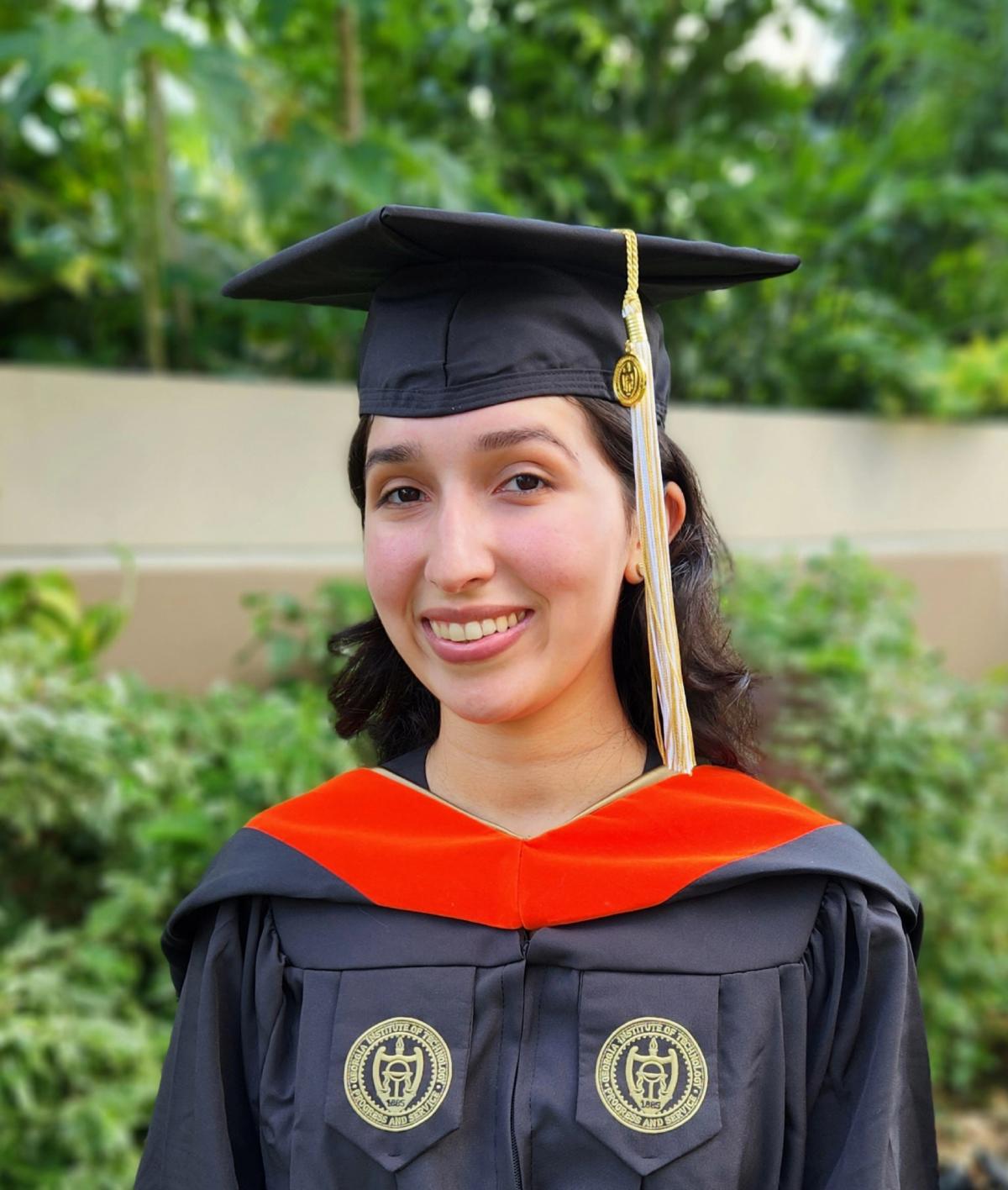
Ivanska V. Báez Cartagena
William Cooperider
MSAE 2024
What is your next adventure?
I’ll be reporting to the United States Military Academy at West Point to serve as a physics and aerospace engineering professor.
What about your next adventure are you most looking forward to?
I’m looking forward to combining the operational experience I’ve had as an Army Officer with the robust educational and research experience that I’ve had here at Georgia Tech and then bring that into my classroom as an instructor to try to help develop the next generation of Army leaders.
Did you have any previous co-op, internship, or research experience in this area?
While I was in graduate school, I was a graduate research assistant (GRA) in the Aerospace Systems Design Lab (ASDL) under Dr. Dimitri Mavris and while there I served as the project manager for the Valkyrie at Sands? For the versatile autonomous lifesaver in combat rescue environment. This research leveraged my military experience to work on the development of a medical evacuation vehicle that’s fully autonomous and both piloted and equipped with medical care for wounded troops in combat. I was able to work on this with support from the Defense Advanced Research Projects Agency (DARPA) and that was a perfect intersection of my previous military experience. What I learned as a graduate student and then leveraged the capabilities of the ASDL to end state, build a product that has proven to be of tremendous value to DARPA.
How did your educational experience at Georgia Tech help you to achieve your goals?
I was a physics major as an undergraduate student and was pretty apprehensive initially about going back to graduate school after being an Army officer for eight years. Georgia Tech’s program is known for being really rigorous and it’s a challenging institution, so coming in I was concerned because I had been out of the game for so long.
But I was able to be placed into an academic environment where it was really east to learn, I was able to work under some incredible research engineers in the ASDL, and then actually surpass what my initial academic expectations were going to be and be a real contributing member to real, actionable research. And for that it was just an incredible experience all around.
What advice would you give to an underclassman who would like to follow the same path?
It’s ok to want to go work in industry and gain some relevant experience prior to going to graduate school. I think especially in engineering, we can feel this need of 'I need to go to graduate school immediately’, and hopefully my experience shows that even if you’ve been out of the academic seat for years, you can leverage that professional experience that you gain to then both be value-added in the classroom and lab.
William Cooperider
Lauren E. Forcey
BSAE 2024
What is your next adventure?
This summer, I will be interning at Blue Origin in Kent, Washington, focusing on the New Glen Program after I get surgery on my knee. I will return to Georgia Tech to start my master’s degree in the BS/MS program.
What about your next adventure are you most looking forward to?
I've never been to Seattle, so I’m excited to go there. I'm a big outdoorsy person, so I want to explore the Pacific Northwest, but I'm also thrilled to work for Blue Origin. It's a different side of space than I’ve worked in the past. I know a few other Georgia Tech people going, which is great. Every single internship I've ever had, there have been Georgia Tech people there. I’m looking forward to going to Seattle with friends, too. I hope the work will be amazing, so I can't wait. Did you have any previous co-op, internship, or research experience in this area?
Did you have any previous co-op, internship, or research experience in this area?
My first internship, I worked at Northrop Grumman after my sophomore year. Then, I interned at Blue Canyon Technologies during my junior summer. I was a NASA Pathways intern for the past two semesters where I did two semesters at Johnson Space Center in Houston. I'm also in the Georgia Tech Space Systems Design Lab with Professor Glenn Lightsey and have been for the last year and a half, where I worked on the VISORS mission, which is a CubeSat formation flying mission.
How did your educational experience at Georgia Tech help you to achieve your goals?
One of the things I love about Georgia Tech is how many opportunities within aerospace there are to get involved outside of classes. It's so important, and it's helped me so much in my internships to have had experiences where I'm applying what I learned in the class and working with other students. It's a little less intimidating to work with your peers sometimes before you go out into the real world or corporate scariness. But everyone here is so brilliant at Georgia Tech, especially in my research lab. The people I worked with are so kind and willing to help out. They mentor people as they come up through the labs. So that's been amazing. I've been so fortunate to work with awesome people and leaders.
What advice would you give to an underclassman who would like to follow the same path?
Get involved in the aerospace community, whether joining an organization like the Aero Maker Space, which I worked in and absolutely loved, or any other organization. So, I highly recommend the Aero Maker Space, whether it's working or just hanging out there. There are so many amazing people that come through. Also, get to know people in your classes. Talk to the person next to you because everyone here is so kind. People seem scary, but they're not. Everyone's just trying to get through this together. You can't get through this alone. You have to lean on the people around you, so that'd be my most significant piece of advice.
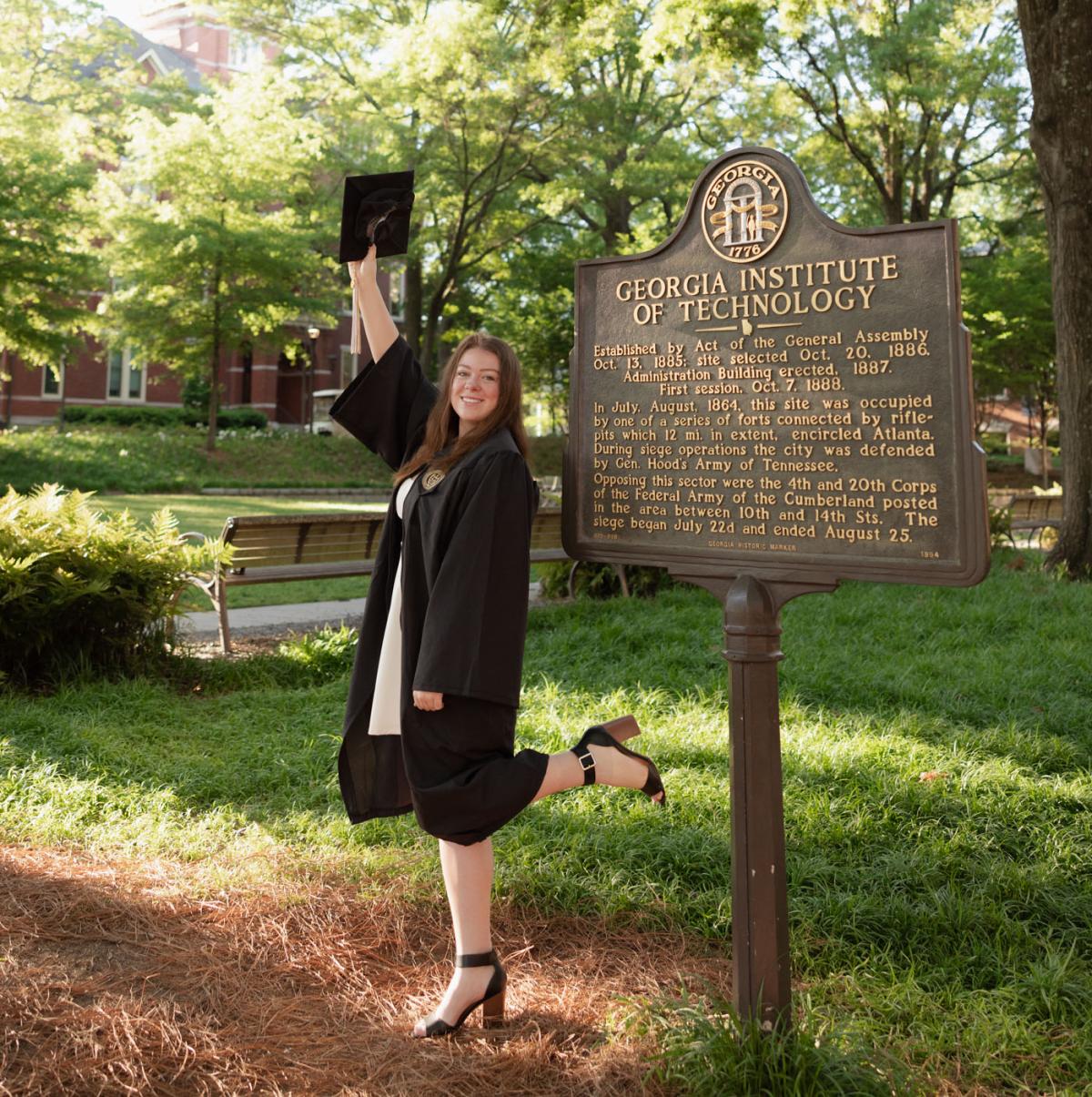
Lauren E. Forcey
Samuel Hart
Ph.D. 2024
What’s your Next Adventure?
In January, I’m headed to SpaceX in South Texas where I’m going to be an engineer in their Thermal Fluids and Life Support team for the crewed portion of Starship.
What about your next adventure are you most looking forward to?
I’m excited that it’s such a big change from what I’ve been doing for so long. All my undergrad and graduate career and internships have all been centered around small, uncrewed spacecraft. I’ll be transitioning from that to a crewed spacecraft, which also happens to be the largest rocket ever built, so it’s a really big change and I’m sure there’s going to be a lot of challenges that come along with that, so I think it will be a really cool experience.
I’m also excited to work on something that’s actually going to carry people to space and the moon, and that’s pretty awesome.
Did you have any previous co-op, internship, or research experience in this area?
During my junior year of undergrad, I took eight months off of schoolwork and interned at NASA Marshall in Huntsville, Alabama. It was my first internship experience and my first real hardware experience. I worked on both ground support and testing small monopropellant thrusters for CubeSats using a new propellant to replace hydrazine, which is suppose to be less toxic and easier to work with.
Later, I interned at MIT Lincoln Lab for a summer and went back to MIT Lincoln Lab again before graduate school.
When I got to Tech, I joined the Space System’s Design Lab and worked with Dr. Glenn Lightsey where I spent my first two years of graduate school working on CubeSat propulsion systems, designing, building, testing, and delivering them to space.
When I started my research for my Ph.D, I was working on fluid positioning. So, when you have a CubeSat tank in space and you need to extract liquid propellant from the tank, or a gas, to send to a thruster, how do you know where the liquid and gas are sitting when there’s no gravity to control where the bubbles go? That’s been most of my research, moving fluids around in space. Now, I’m going to do a full-time job where I move fluids around in space, so it’s not that different.
How did your educational experience at Georgia Tech help you to achieve your goals?
During my undergraduate years, I was only focused on my schoolwork and wasn’t involved in any clubs, so I didn’t really have any of the skills that you’d gain out of those experiences. I had a little bit from internships, but that only takes you so far. I got involved in research towards the end and that helped me get into graduate school.
So, at Tech, I’ve spent years working on flight hardware and a lot of things I probably should have learned as an undergrad. That hardware experience has been invaluable to me and allowed me to work with JPL and other NASA folks, and really grow as an engineer.
There are a lot of things I thought I knew when I started here, but looking back I can say I certainly didn’t know. So, I think spending all this time doing actual research and working with other grad students as well as faculty really helped me to grow into somebody that can look a little more critically at things and accept that there’s a lot left to learn.
What advice would you give to an underclassman who would like to follow the same path?
Start early. I didn’t and I should have. A lot of the things that were so great about Georgia Tech, like getting to work on flight hardware and all this stuff is also available to undergraduates. I see undergrads in their second year here who are doing all the same stuff as me. They’re getting that hands on experience. They’re in charge of flight hardware and sending things to space.
Join clubs. I think joining clubs is super valuable too. The things you learn from actually building stuff as opposed to taking classes and doing math about the stuff you might build are highly valuable. There’s a lot of skill you don’t pick up unless you go and do it.
If you’re interested in grad school, talking to some grad students is the first move anyone should make. Luckily, I had a lot of great graduate mentors, both when I was an undergrad and as a grad student who guided me along the way.
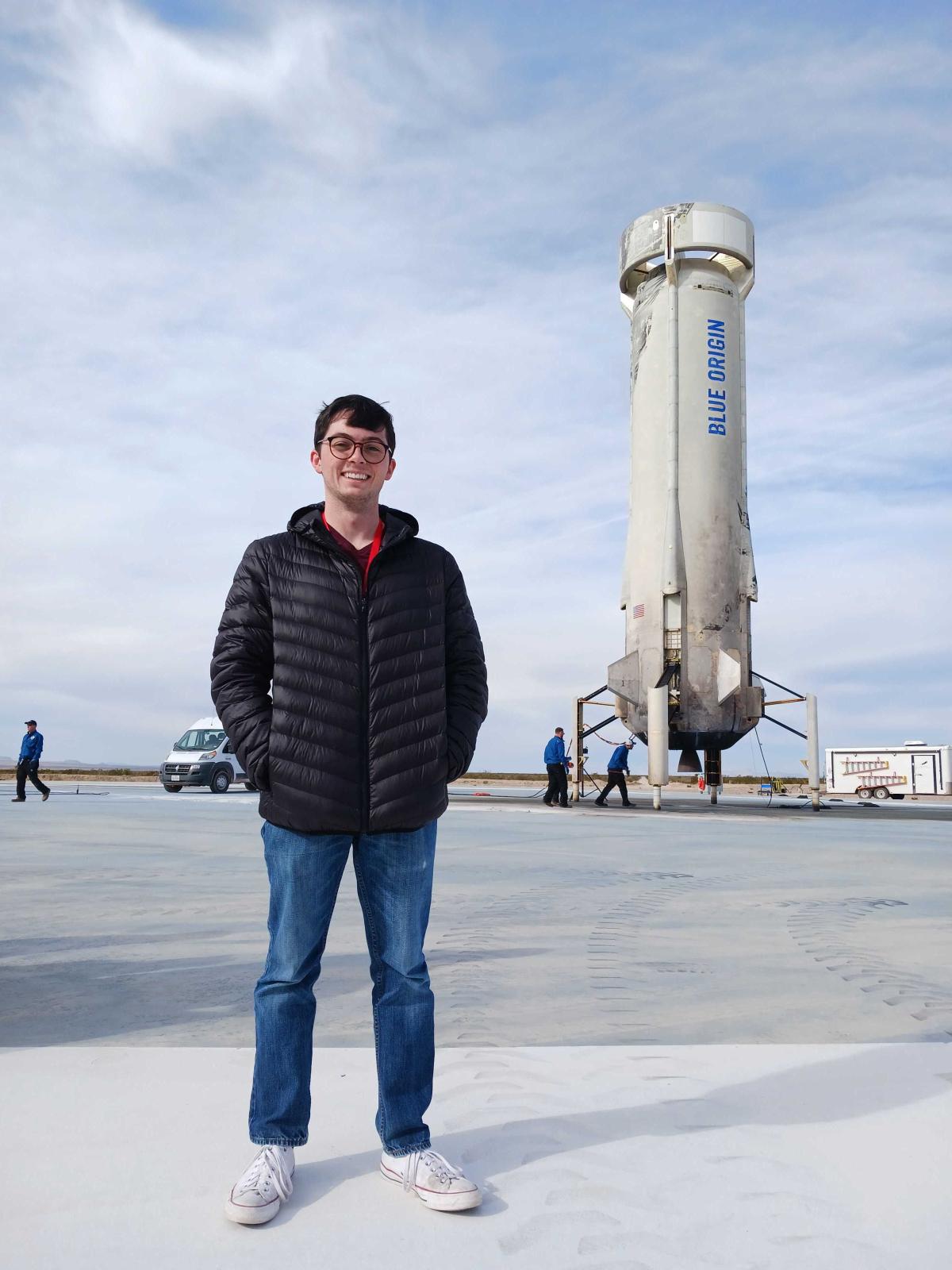
Sam Hart
Stephanie Introne
M.S. AE 2021, Ph.D. AE 2024
What is your next adventure?
After graduation, I’ll begin working at Aerospace Corporation in Colorado Springs as an analyst with their Space Enterprise Design and Optimization Department. I’ll be working on providing information to support decision making for satellite constellation design for government clients.
What about your next adventure are you most looking forward to?
For me it's that the next step really does feel like a new adventure. I know that a lot of people say that, but I'm looking at, moving to a new place I haven't been before, actually joining the workforce instead of being a student, which I’ve been for the past eight years. So, I’m just looking forward to really getting to do something new, while also getting to use my academic background.
Did you have any previous co-op, internship, or research experience in this area?
As an undergrad, I interned at NASA Goddard four times, so that was really exciting. I worked with the Satellite Servicing Projects Division on testing tools for the astronauts to use on the International Space Station, which involved attending sessions at the Neutral Buoyancy Lab in Houston. I also did some work on designing test hardware to be used in environmental testing for some of the upcoming space telescopes.
My research at Georgia Tech was actually very closely related to the work I’m expecting to do at my new role. The focus of my thesis was on decision support for cislunar mission planning. I also did sponsored research with the Georgia Tech Research Institute (GTRI) on modeling and analysis for a future lunar base.
How did your educational experience at Georgia Tech help you to achieve your goals?
I came out of undergrad knowing that I wanted to focus on space, but I was coming from a more general mechanical engineering background from my previous university.
So, Georgia Tech was really the opportunity for me to become more specialized in aerospace and develop that skillset that I needed in order to fully transition. Being in the Aerospace Systems Design Lab (ASDL) has been incredibly formative in terms of my academic experience and given me exposure to all of these different networking opportunities and resources, it’s had a huge impact on my academics.
What advice would you give to an underclassman who would like to follow the same path?
Hold onto - or maintain - that passion for learning. I think that being interested in grad school indicates wanting to continue to learn and sometimes with everything that’s going on you can get caught up in work and you can get separated from this real drive to learn. I think that whenever I tapped into those periods of time where I really wanted to learn something new, I’ve seen really good return. And I also think that type of posture has been beneficial throughout my academic and career trajectory.
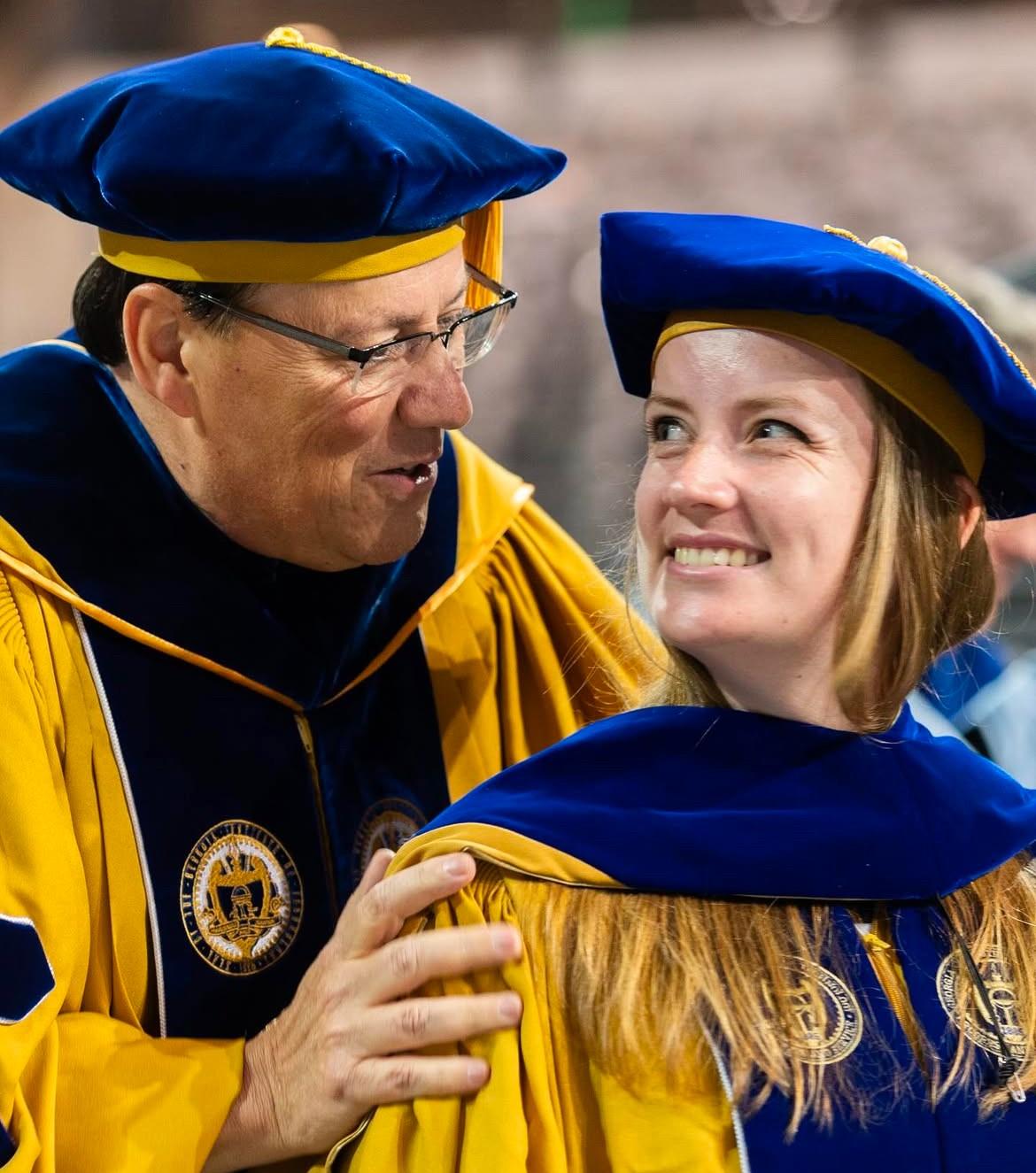
Stephanie Introne after receiving her hood from her advisor, Professor Dimitri Mavris
Schuyler J. McCaa
BSAE 2024
What is your next adventure?
I will be working at Vaya Space in Cocoa Beach, Florida, as a system engineer. Vaya is a hybrid rocketry company, which is not very common in the air space industry right now, and they're building a small satellite launch vehicle.
What about your next adventure are you most looking forward to?
I interned with Vaya Space over the summer, and I still intern with them now, so I actually know the team pretty well. I really enjoy the people there. They have dogs in their offices. I also loved being in Florida over the summer and since I've never really left Atlanta my entire life, I'm very excited to kind of leave the nest to explore. I love hot weather, and it's never cold. It's too cold for me right now.
Did you have any previous co-op, internship, or research experience in this area?
I interned for NASA. In the summer of 2022, I had just finished my sophomore year, and I worked at the Marshall Space Flight Center in Alabama at the Advanced Concepts Office. I worked a lot in mission modeling and 3D printing. They were working on a cryogenic demonstration. Then in Spring 2023, I interned at the Johnson Space Center in Houston, Texas. I was a space suit engineering intern. I did a lot of CAD work, and I wrote some repair manuals.
While interning at Vaya, I was in charge of the environmental loads analysis while the vehicles were in storage, transit, or operation. I had to make sure that the vehicle was designed properly and that nothing would damage the vehicle in any of those phases and prevent it from successfully flying.
For the past year and a half, I’ve been the president of the Yellow Jacket Space Program (YJSP), which is the big collegiate liquid rocketry team here. It’s where I received a lot of my systems engineering experience. So, when I applied to work at Vaya over the summer, I was able to reference back to a lot of the experience I've had as president. I was able to learn a lot more about that field during my internships. It was a great experience to prepare me for my full-time position.
How did your educational experience at Georgia Tech help you to achieve your goals?
Honestly, I would say joining the YJSP was a big thing for me because when I joined, there were no in-person classes due to COVID. So, there was really no way to meet people and go beyond what was being taught in classes. I joined YJSP freshman year, and was able to dip my toes a little bit in all these different areas early on. Georgia Tech has so many different disciplines that you can work in, so you can figure out your interests. I also learned a lot just from being in good classes with good professors.
What advice would you give to an underclassman who would like to follow the same path?
Try everything and dig into each class. You never know what you are going to like. I didn’t come to Georgia Tech thinking I would be a systems engineer. I didn’t even know that existed. I didn’t know the different aspects of aerospace and rocketry. All I knew was that I liked rockets, and I thought they were cool. Say yes to all types of opportunities. Doing that helped me find my place. It is even beneficial to go into places where you're unsure of your interest because you’ll get that experience. You can figure out what you like about sitting at a desk and what you like about being out in the field. Those experiences help prepare you for when you graduate to go after a job that you know will be a perfect fit for you.
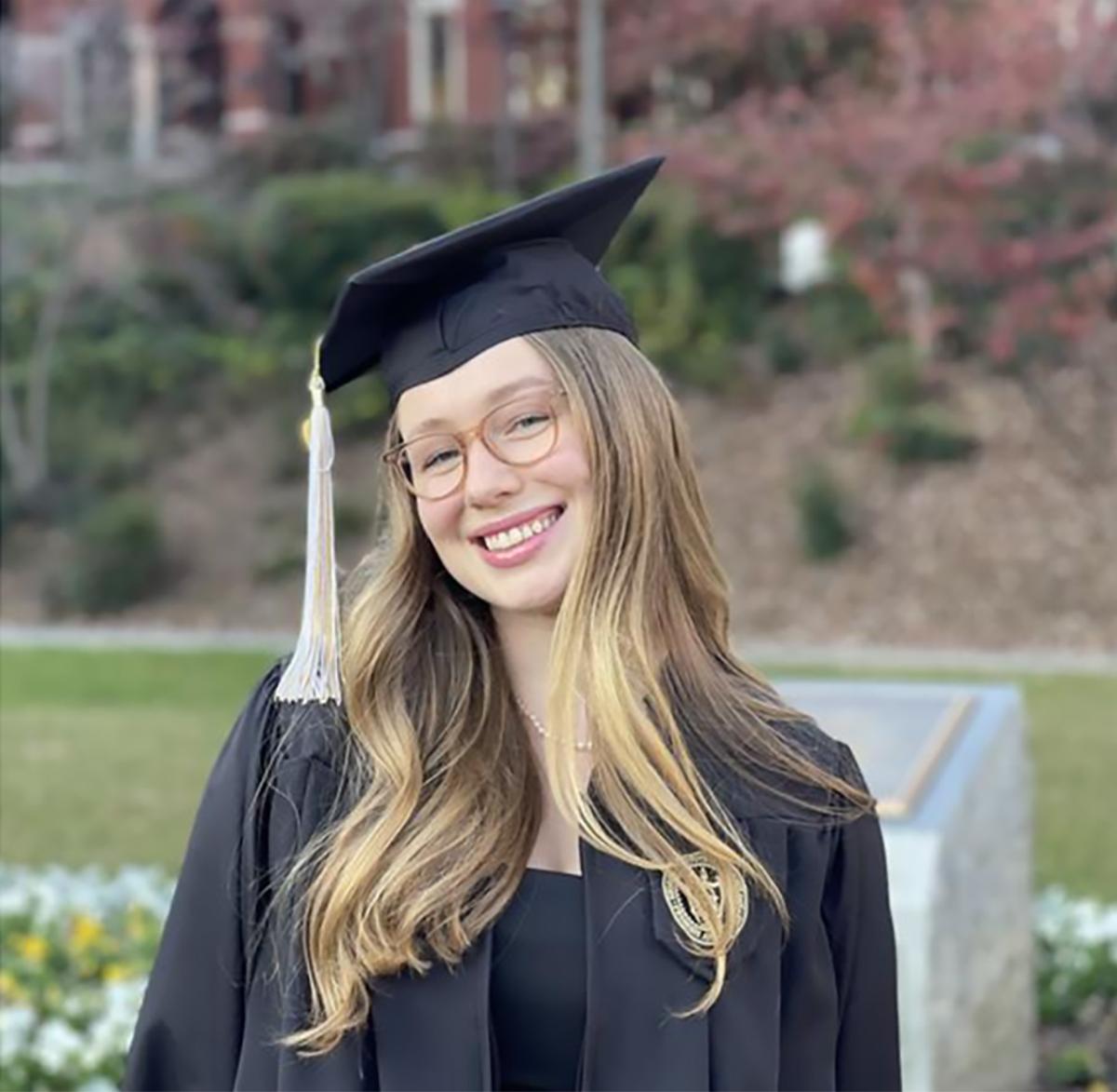
Schuyler J. McCaa
Tensei A Nakamura
BSAE 2024
What is your next adventure?
I have a return offer from Northrop Grumman. It is based in Northern California, and I would be working with their manufacturing teams within the marine systems sector. My plan is to relax and travel a bit next spring and start full-time around May or June.
What about your next adventure are you most looking forward to?
I’m looking forward to returning to the West Coast, where I have spent the past few summers, and continuing to pursue my interests within and outside of work. Northrop Grumman is always developing new technologies that I’m excited to potentially contribute to. I want to develop a diverse skillset in my first few years before eventually specializing in a field or skill that I’m passionate about.
I enjoy the outdoors including hiking, playing pick-up sports, and I want to get into skiing. I think California includes something for all my interests including the diverse cuisine, ideal weather, friends from my previous experiences, and Shohei Ohtani (baseball pitcher, Los Angeles Dodgers). I look forward to developing my career and my personal ambitions.
Did you have any previous co-op, internship, or research experience in this area?
I interned at Northrop Grumman last summer on their tool design team within their manufacturing group. I designed tools and fixtures that helped engineers, technicians, and machinists perform their work easier.
Prior to that, I completed a co-op with Rolls Royce. I did three rotations between August 2022 and April 2024. I gained ample experience familiarizing myself with the jet engine products that Rolls-Royce develops and working with the manufacturing and design teams. I had the unique opportunity of contributing to the transition from Research & Development (R&D) into production at one of the satellite facilities.
How did your educational experience at Georgia Tech help you to achieve your goals?
Georgia Tech provided me with all the resources that I needed to succeed, whether I initially thought I would need it or not. The curriculum is diverse and exposes you to so many aspects of the aerospace industry. It allows you to figure out what your preferences and interests are. We have incredible networking opportunities here, and the aerospace industry connections are top-tier. I will always appreciate the people who I met, worked with, and helped me. I have never met a person at Georgia Tech who genuinely did not want me to succeed. Georgia Tech also teaches you a strong work ethic because the courseload provides big challenges. You have to learn how to solve your own problems, but you also know that there are people who will motivate you and who want you to succeed.
I was on the Solar Racing Team working on their aerobody design. Solar racing helped me during my underclassman years learn how to put my concepts from the classroom into real-life situations and prepare for my internships.
I started working in the video broadcasting department and that took up a lot of time because we were always busy with football, basketball, baseball, softball, and volleyball. I watch a lot of sports, and it was an incredible experience working with Georgia Tech in our Athletics department.
What advice would you give to an underclassman who would like to follow the same path?
I came here during COVID, so that was a little bit different. In general, put yourself out there, think of a few interests you have, and then find what can help you pursue those interests.
There are so many clubs where you can find your niche. People are approachable. Atlanta and Georgia Tech are hubs for future industry leaders. Don’t be afraid to go up to someone and start a conversation. You never know if that’s your future best friend, mentor, or business partner.
Also, learn and do non-engineering activities. Even though I was an aerospace major, I was able to work in the broadcasting department within Athletics. I get to work behind the scenes of broadcasting sports, and I’ve met Calvin Johnson and Joe Hamilton. Most schools have broadcasting majors that would do my job. As an engineering school, we are given the opportunity to pursue these avenues. You can be yourself at Georgia Tech, and that doesn’t just have to be engineering related.
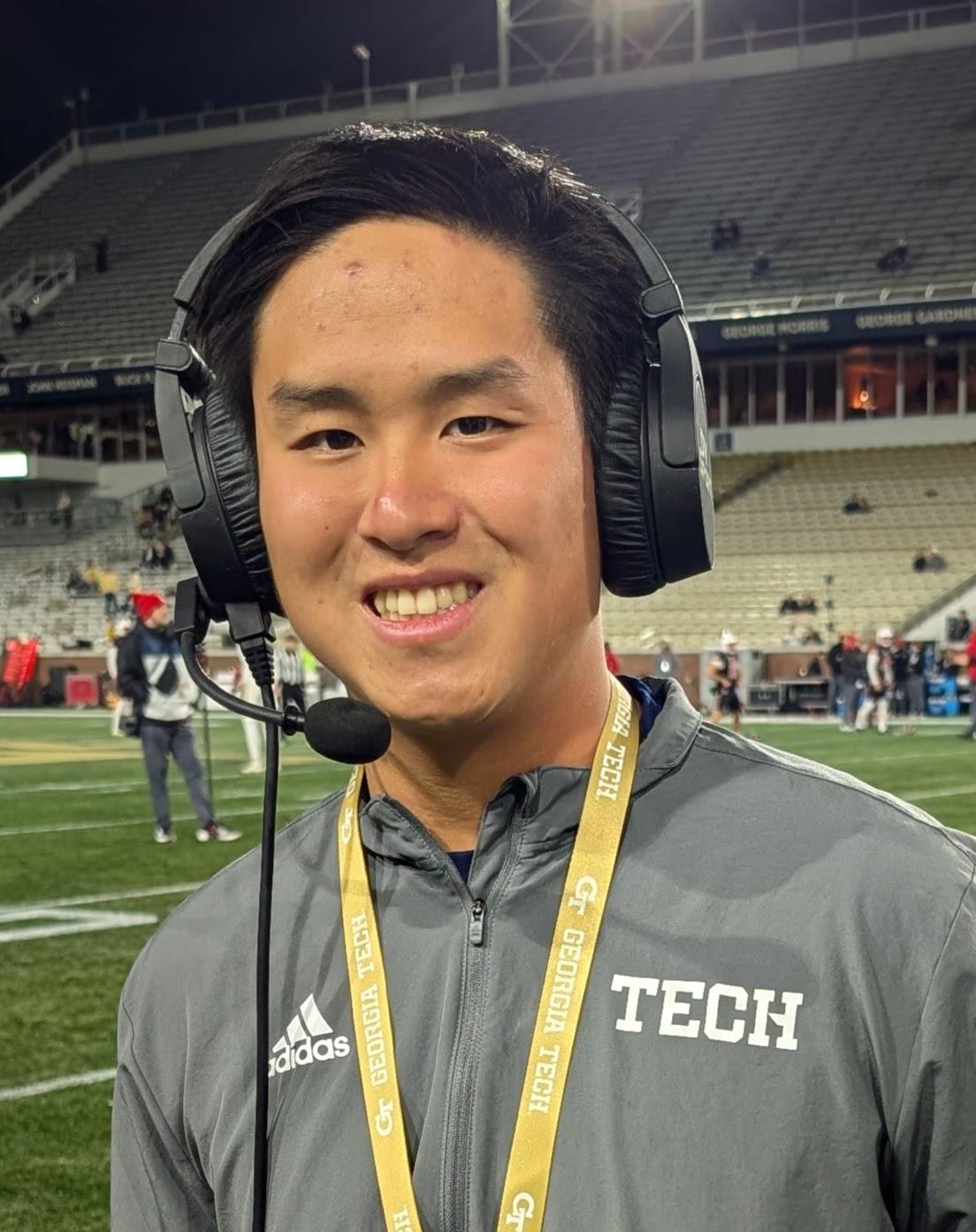
Tensei A. Nakamura
Ifeoluwa M. Oloworaran
BSAE 2024
What is your next adventure?
I’m job hunting. I’m hoping to stay in Atlanta, Georgia. I come from Asheville, North Carolina, but I am Nigerian. I enjoy getting my hands dirty and figuring things out. I’m also very interested in propulsion. I'm also looking to enter into the manufacturing space. So, I hope to start with manufacturing and process engineering and then pivot into the engine space. Otherwise, I'll be looking to go to Europe and see if I can work for an aircraft manufacturing company there.
What about your next adventure are you most looking forward to?
Honestly, I'm not sure. I get a little anxious not knowing. I'm hoping to find a job, so I can apply myself in the workspace because I like working and creating stuff. I can’t wait to see what the future holds. Did you have any previous co-op, internship, or research experience in this area?
In my sophomore year, I worked in model-based systems engineering with Selcuk Cimtalay. I learned how to use Magic Draw and did a couple of projects under him, making sure we knew how to utilize the tool.
After that, I got a seven-month co-op position at Cummings. I worked with their 45 and 60-liter diesel engines, and my job was customer tailoring. If the customer had any issues with their engines, my job was to figure out how to fix them and validate the changes I would propose. I also did design reviews for them earlier this year.
I was a part of the team that entered the Vertical Flight Society student design competition. We designed a helicopter, pretty much from scratch, for disaster relief. Defcon Army Research Laboratory sponsored the competition. We came in second.
This semester, I’ve been working at the Ben T. Zinn Combustion lab on the visualization of weak vortices.
How did your educational experience at Georgia Tech help you to achieve your goals?
I came in as a timid student and I was lucky to join a living learning community. I was a member of Impact. I learned how to come out of my shell and not be afraid to speak up. It was also during COVID, so, if I didn't make an effort to get to know people, I wouldn't know anybody. Being here, especially during COVID, forced me to stop being shy. Also, with the way Georgia Tech is structured with classes, you’re forced to interact with your classmates if you want to succeed, which I also had to learn. When I finally started interacting with people and working in a team, I began to see my grades improve because sometimes, people had questions I hadn't even thought of.
What advice would you give to an underclassman who would like to follow the same path?
Follow your passion. When I first chose aerospace, especially being international, a lot of people told me to drop it as a major. My parents said don't worry and do whatever you want. It is great advice. Whilst I don't have a job yet, I know I did the right thing. It's easier to learn something when you're passionate about it. Tap into all of the resources here at Georgia Tech. There is so much here to explore.
Collaborate with other people because I struggled a lot less when I did, which was nice. Get involved in extracurricular activities because it can get pretty stressful, and having a space to relax after a long day is nice. I was quite involved with extracurriculars. I also made sure to involve myself in sports.
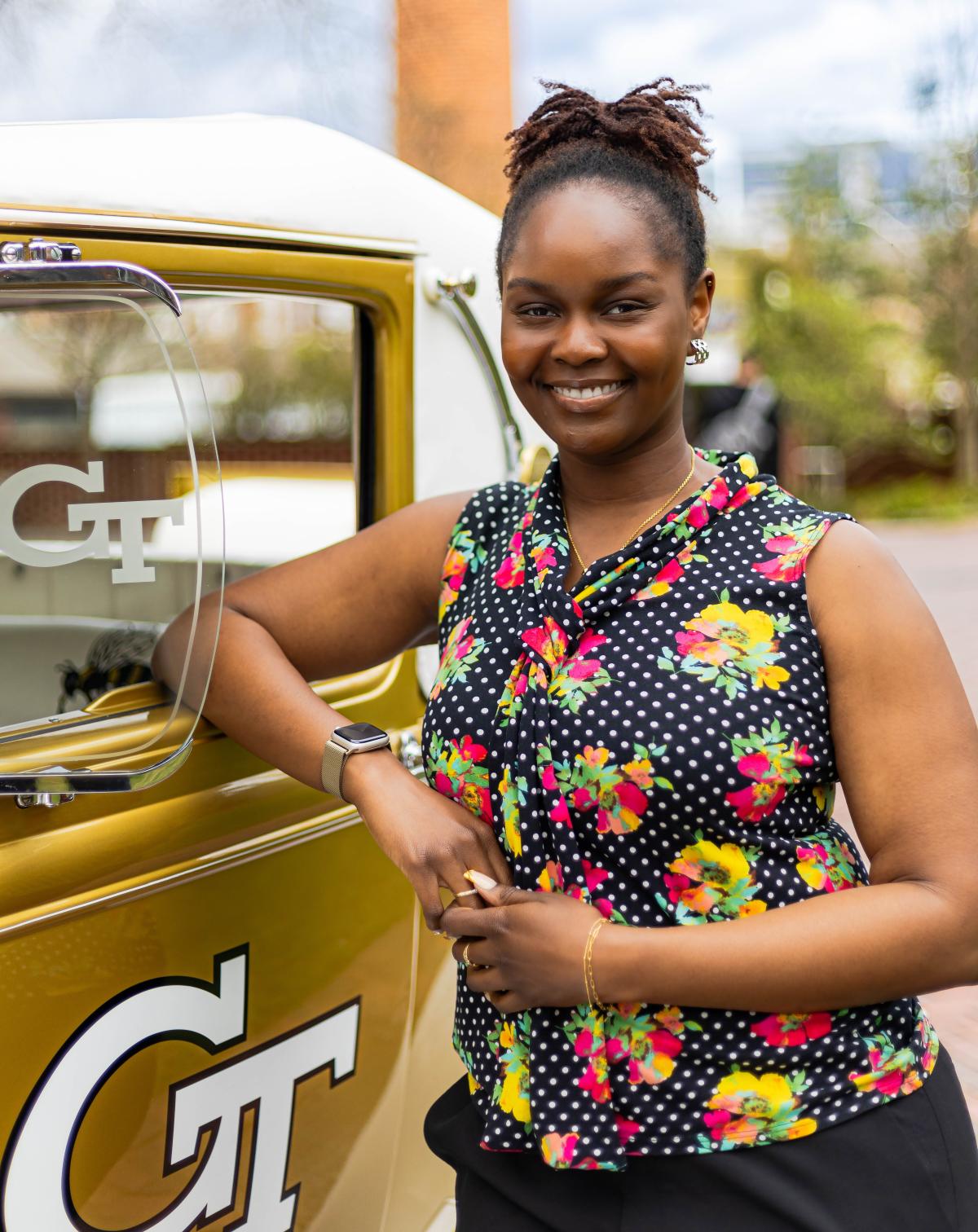
Ifeoluwa M. Oloworaran
(text and background only visible when logged in)